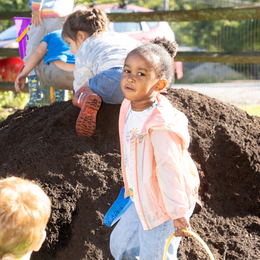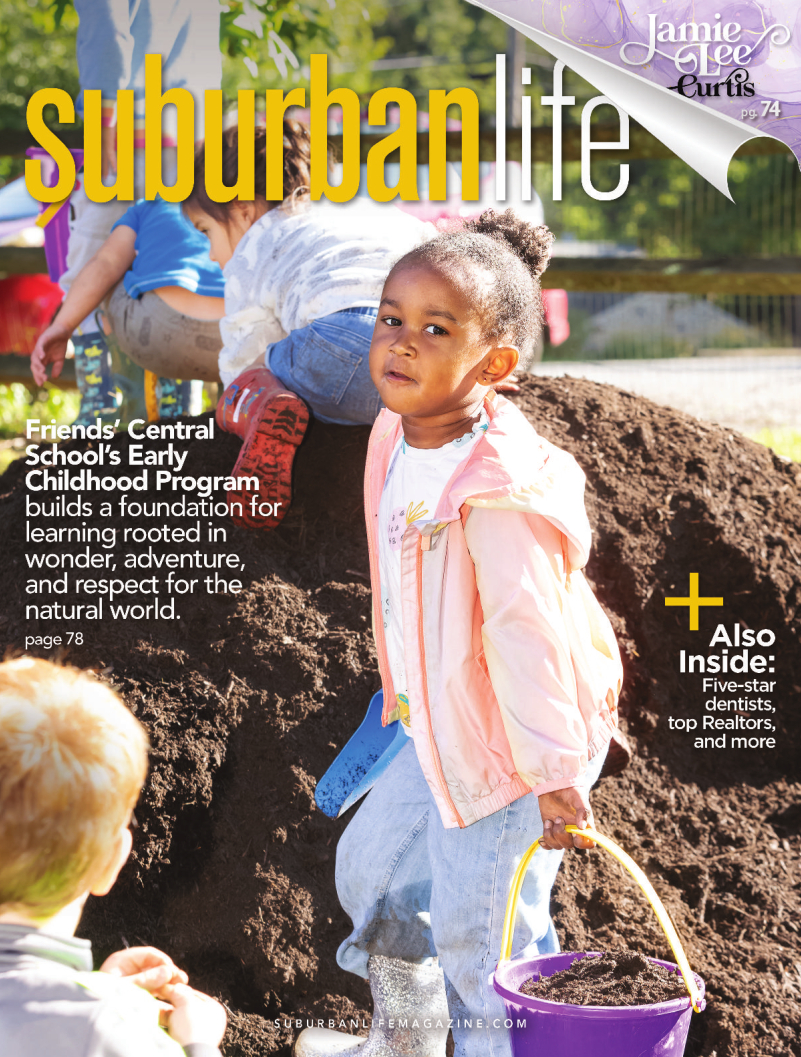
The Magic of Exploration
Friends’ Central School’s Early Childhood Program builds a foundation for learning rooted in wonder, adventure, and respect for the natural world.
Early childhood should be a time of boundless exploration. No one knows this more than the educators of the Early Childhood Program at Friends’ Central School in Wynnewood.
“Early childhood is one of the most important times in a child’s life,” says Melody Acinapura, principal of Friends’ Central’s Lower School. “It’s their introduction to learning and becoming an excellent community member—to figuring out that they are part of a bigger world. Our mission is to graduate young adults who are changemakers, and I think that begins in nursery, pre-K, and kindergarten. These are crucial years—where students are introduced to the building blocks of formal learning. It’s where, in the right school, they become lifelong learners, seeking answers to big questions and approaching the world with curiosity.”
While nursery, pre-kindergarten, and kindergarten at FCS are all unique, outdoor learning is central to each. Acinapura estimates that children enrolled in Friends’ Central’s Nature Nursery program—ideal for children as young as two years and seven months of age—spend approximately 70 percent of each school day outside.
Only in its third year, Nature Nursery takes full advantage of the school’s sprawling 18-acre campus, which features myriad outdoor spaces to learn and explore, including a pond teeming with wildlife, a wooded area known as the Nature Playground, bird blinds, a grove with tables and a nearby chicken coop, and a special area with tree-stump seating—perfect for story time. Students have a home classroom, where they gather in the morning and sometimes complete bigger projects, but Suchita Fiorillo, a lead teacher for the Nature Nursery program, believes the campus has an abundance of special places where children gather and grow.
“It really is a magical campus with so many things to soak up and learn from being outside,” Fiorillo says. “One of our retention basins has three amazing cypress trees with the softest needles and these gentle little hills, and we examine the bark and lay in the needles when they start to fall. Our other retention basin is filled with wildflowers that a Nature Nursery class helped plant, and the children said kind things to the plants to help them grow. We’re so lucky we get to do this.”
“In nature, our students learn by exploring,” Acinapura adds. “Kindergarten is when we elevate structured classroom learning to prime students to be academically ready for our rigorous elementary curriculum. Pre-K is a key skill-building bridge between Nature Nursery and Kindergarten. Outdoor time for students is about more than climbing, jumping in puddles, and enjoying the seasons.”
According to Acinapura, Nature Nursery incorporates many different academic disciplines in ways that can organically spark a student’s imagination. She sees this impact every day.
“I think it is building natural curiosity,” she says. “For example, yesterday the Nursery teacher wrote about how they were in a retention basin and explored all the properties of what they were seeing in their natural habitats. In 20 minutes, they covered physics, literacy, and math. One student wanted to know why things roll downhill, but not uphill. Questions like that are the building blocks that springboard students’ intrinsic motivation to go further.”
Students learn about Quaker principles such as diversity, equity, and justice, as well as respect for the natural world.
“We’re not just growing adults who are going to be happy and successful,” Acinapura says. “We are growing people who are going to have an impact on the world around them, and you can’t do that without keeping the spiritual, intellectual, and ethical promise at the core. And that starts when students are in Nursery.”
As children move from Nature Nursery to pre-K to kindergarten, learning becomes more thematic. Each year the school chooses a theme that will span multiple disciplines, so students learn deeper, not wider. This year’s theme: “Another Time, Another Place.” Some older students will examine topics such as national parks, asking questions regarding land acquisition and inclusivity, while others will delve into the Harlem Renaissance, space travel, or the lore and significance of dragons in Asian and South American cultures. Nature Nursery students will focus on woodland wonders, while the pre-K class examines the origins of fairy tales.
Students throughout the Early Childhood Program learn Spanish and music, and spend time in the Light Lab maker space, out by the pond, and visiting the chickens. Every on-campus interaction becomes an opportunity to explore deep questions about life and humanity’s place in the world.
“One day, we were on a nature walk, and we saw a dead mouse,” Fiorillo says. “A three-year-old student asked why it was melting. We talked about how we experimented watching a banana in a container decompose, and how that helps the flowers grow bigger by becoming compost. Life, death, decomposition—we are having these giant adult conversations with two-, three-, and four-year-olds.
“Our job is to answer their questions in a way that is suitable for their age and development,” she continues. “It’s important to teach children how we can find ways to express sadness in a way that is safe and comforting. These children are so smart, so bright, and if they have those questions, our job is to tie that into our Quaker values and how we can be stewards of the earth in general.”
The Nature Nursery program started as a single cohort of 24 students but has since blossomed into three sections of 10 students, each with a waiting pool. Acinapura encourages parents to contact the school in the fall for the following year.
She does, however, offer a few playful words of caution: “You will do more laundry and go through more shoes than you ever thought you would. You’ll wonder why you’re packing as if you’re dropping your child off in Patagonia; kids in the program have to have a rain suit.”
At the end of the day, she says it’s worth it to see a child who is happy and engaged with the world around them. “It makes me feel good as a parent that Friends’ Central is giving such a well-rounded, multifaceted education to kids at such a young age.”
Friends’ Central School
friendscentral.org
friendscentral.org
Lower School Campus
228 Old Gulph Road
Wynnewood, PA 19096
(610) 642-7575
228 Old Gulph Road
Wynnewood, PA 19096
(610) 642-7575
Middle and Upper School Campus
1101 City Ave.
Wynnewood, PA 19096
(610) 649-7440
1101 City Ave.
Wynnewood, PA 19096
(610) 649-7440
Photo by Nina Lea Photography
Published (and copyrighted) in Suburban Life, September 2023.



